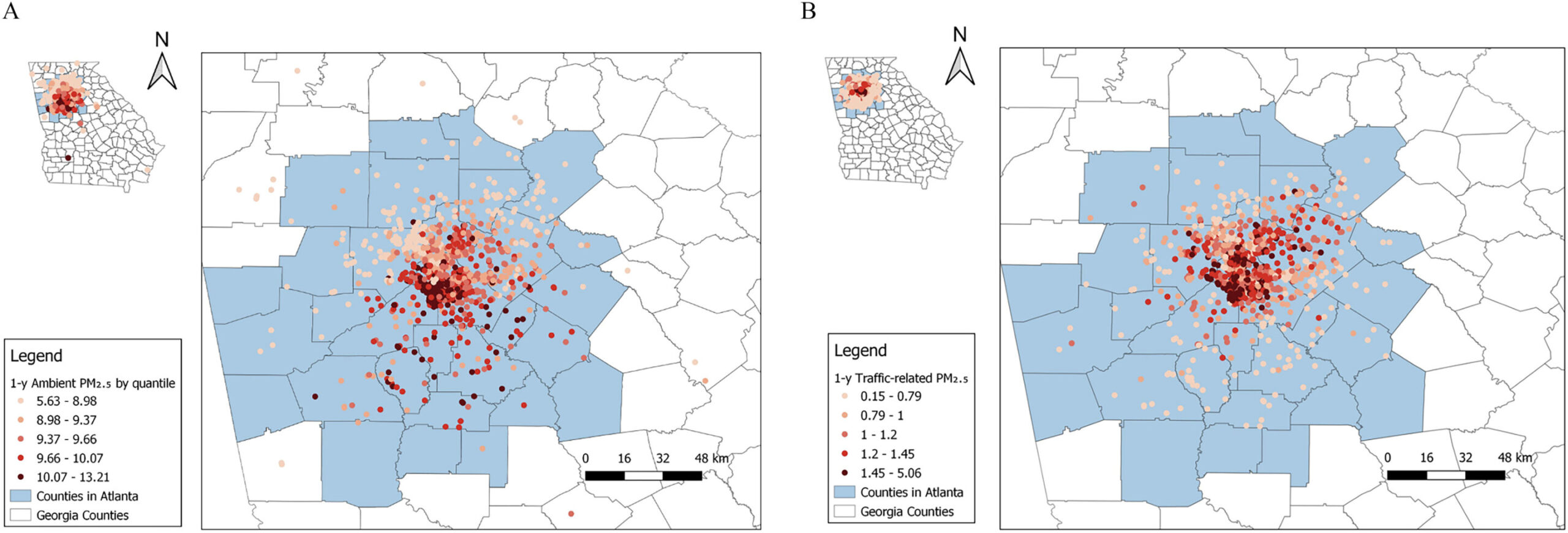Health
Research shows that air pollution is associated with an increased risk of developing Alzheimer’s disease

Map of the geographical distribution of the study population and their residential PM2.5 exposure concentrations in the year prior to sample collection. Each dot represents an EHBS participant. Credit: Environmental health perspectives (2024). DOI: 10.1289/EHP13503
A new study from Emory University has found that adults exposed to high levels of air pollution are at increased risk of developing Alzheimer’s disease.
In a study of 1,113 participants between the ages of 45 and 75 from the Emory Healthy Brain Study, all of whom were from the Atlanta metropolitan area, researchers found positive biomarkers for Alzheimer’s disease – specifically amyloid plaques – in the cerebrospinal fluid of participants who were exposed to environmental and traffic-related air pollution at home.
This study, that was published in Environmental health perspectiveswas the largest of its kind and adds to the growing body of evidence – including other recent studies from Emory University – that suggests air pollution directly contributes to brain degeneration.
What the experts say
“Together, our recent studies represent both ends of the spectrum. In our previous study, we demonstrated links between residential exposure to air pollution and Alzheimer’s disease-related brain changes in an autopsy cohort. adults who were on average 15 years younger and cognitively healthy.
“This is important because it shows that home air pollution can negatively impact our brains, even decades before we actually develop Alzheimer’s disease. This points to a sensitive period for both exposure and opportunity, because that is when prevention strategies and interventions are most effective. ,” said Anke Huels, Ph.D., lead author of the study and assistant professor in the Department of Epidemiology at Emory’s Rollins School of Public Health.
“We know that air pollution is generally bad for human health, including brain health. By showing a link with levels of amyloid protein in cerebrospinal fluid, this study suggests that air pollution increases the risk of developing could increase Alzheimer’s disease. The flip side of that is that by cleaning up our environment, we can also help reduce the burden of Alzheimer’s disease,” said James Lah, MD/Ph.D., principal investigator of the Emory Healthy Brain. Study and associate professor in the Department of Neurology at Emory School of Medicine.
Ways to reduce exposure to air pollution
- Limit time and avoid outdoor physical activity on days when your local air quality index indicates poor air quality.
- If you must be outside on days with poor air quality, consider wearing a mask, such as an N95 mask.
- Do other things known to help reduce your risk of Alzheimer’s, including these tips from the Centers for Disease Control and Prevention:
- Practice eating a healthy diet.
- Participate in regular physical activity.
- Prevent/manage high blood pressure and blood sugar levels.
- Stop smoking and avoid excessive alcohol consumption.
- Gets enough sleep.
More information:
Emma Casey et al., Association between particulate matter exposure and cerebrospinal fluid biomarkers of Alzheimer’s disease in a cognitively healthy population-based cohort, Environmental health perspectives (2024). DOI: 10.1289/EHP13503
Quote: Research shows air pollution is associated with an increased risk of developing Alzheimer’s disease (2024, April 11) Retrieved April 14, 2024 from https://medicalxpress.com/news/2024-04-air-pollution- alzheimer-disease.html
This document is copyrighted. Except for fair dealing purposes for the purpose of private study or research, no part may be reproduced without written permission. The content is provided for informational purposes only.













